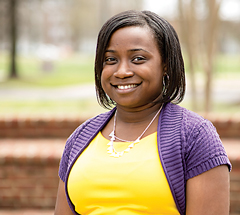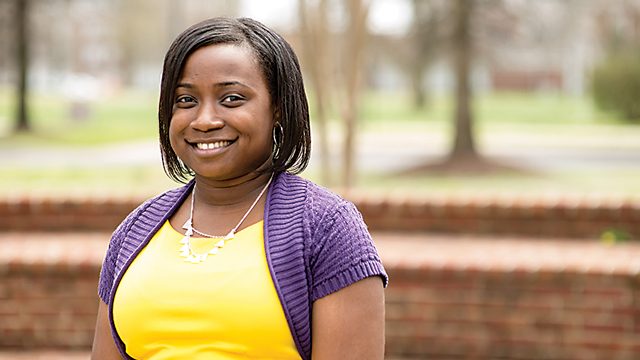Late one Tuesday afternoon, in a stuffy committee room filled with lobbyists and legislators on the ninth floor of the General Assembly building, an enthusiastic voice rang out: “Woo-hoo for the bill!”
Needless to say, this is not the type of testimony the budget-writing legislators are used to hearing. But the genuine passion of Sophia Booker, who had just shared her personal experience of being a teenager in Virginia’s foster care system, made a huge impact.
Sophia, youth network coordinator at UMFS and a student at VCU, was at the General Assembly to rally support for the Fostering Futures program, an initiative proposed by Governor Terry McAuliffe and ultimately accepted by the General Assembly. While Sophia and her twin sister were eventually adopted, many of the children with whom she works at UMFS were not adopted or reunited with their birth families, and they turned eighteen without having the backup and support of family most children take for granted. Approximately 500 such teens age out of foster care every year in Virginia, a rate that puts our state at the bottom of rankings.
The Fostering Futures program, which Voices for Virginia’s Children and other advocates have been working to get Virginia to adopt for several years, will start July 1. It will help youth who opt into the program by funding their housing (either continuing to live with foster parents or to live independently) and providing other supportive services up to age twenty-one. Youth are required to be working and/or in school as a condition of the program. Thirty other states and the District of Columbia have already adopted similar programs, and their results show a 13 percent decrease in incarceration rates, a 23 percent increase in school enrollment, and a significant reduction in rates of homelessness among participating young people.
The road to success – both for the program and the young people it affects – has been anything but easy. It is a powerful reminder of the importance of perseverance.
One element that made the advocacy effort more powerful this year was the participation of current and former foster youth from all over the state. Advocates like Sophia organized listening sessions with key legislators so that they could better understand the needs of these youth, and they and their mentors traveled to testify at the General Assembly several times.

“I did it for the kids I work with – some are really struggling,” said Sophia. Young people often have difficulty making it on their own, paying rent, and working or going to school. Statistically speaking, former foster kids are significantly more likely than other youth to become homeless, pregnant, abuse substances, and get arrested. Only about 3 percent ever get a college degree.
Sophia is defying the odds with her success. Her goal is to give back, through her major in social work and her minor in psychology. She has gotten this far, she says, because of her family and her network of informal supports, including mentors, coaches, and teachers. She wants all youth aging out of foster care at eighteen to have those same opportunities and supports. Thanks to Sophia’s advocacy and that of other youth, their mentors and coaches, and an array of organizations, those opportunities will start in Virginia on July 1.
Sophia’s guidance for other people considering speaking out to legislators about issues that concern them is great advice for advocates of any age: “Use your voice. Everyone has a voice.”




